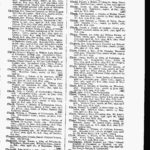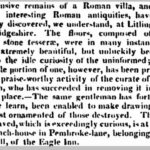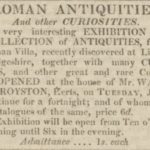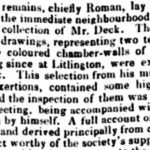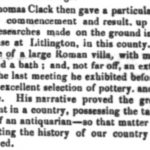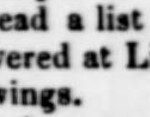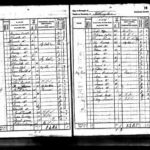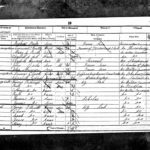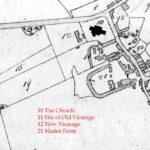Thomas Clack 1774-1852
Baptised at Okehampton, Devon on 24 May 1774, Thomas Clack was the first of ten children born to Rev Thomas and Bridget Diana (nee Stone) Clack.
Thomas was to follow his father into Holy Orders, studying at Exeter College, Oxford, matriculating 6 December 1792 aged 18 and becoming Bachelor of Civil Law in 1804. He had been ordained deacon 30 July 1797, priest 28 July 1799 and appointed curate of Moretonhampstead, Devon on 31 July 1797.
In his personal life he married Elizabeth Sadler at St Martin in the Fields, London on 29 December 1795 and Thomas Edward the first of seven children was baptised at Moretonhampstead on 8 Mar 1797. In 1800 Thomas became rector of Milton Damerel, Devon and the baptisms of their last three children were performed there in 1802, 1803 and 1804. Once all the children were of age change occurred, as Thomas is next recorded as a stipendiary curate in Cambridgeshire. He retained his Devon rectorial parish, leaving it in the care of a curate.
Move to Cambridgeshire
There is mention that Thomas was appointed stipendiary curate at Llanedi, Carmarthenshire on 26 December 1826, but this is almost certainly an error, as he was appointed on 4 January 1827 stipendiary curate of both Steeple Morden and Guilden Morden, Cambridgeshire. Indeed, his appointment to the Mordens was recorded earlier under the mis-spelt name Craick, on 29 November 1826. His purchase of a Game Certificate as “Thomas Clack of Litlington” in September 1826 supports a 1826 start date. The 1827 entry may have been to correct his name in the records.
His annual stipends were £70 from Steeple and £50 from Guilden. Interestingly, he took up residence in the old Vicarage at Litlington, situated in a close between the Church and Manor Farm, where Litlington village school was later sited. The vicarages at Guilden and Steeple were both in poor repair and needed heavy expenditure to make them habitable. In 1836 Clack was described as “living in lodgings in Litlington, being too poor to afford furniture or even a servant”.
The move from Devon to Cambridgeshire was almost certainly the consequence of Thomas and his wife Elizabeth deciding to separate in 1826. She went to live in London, where she died 1845, and he continued life as a country clergyman, albeit in a quite different location. Thomas Clack (Rev not mentioned) of Litlington is recorded as purchasing a Game Certificate (licence to hunt game) in September 1826 and subsequently as Rev Thomas Clack of Litlington the same in 1828 and 1829. He may have done likewise in other years.
Litlington Roman Villa
In 1829, in circumstances that are not clear the remains of a Roman villa and burial ground were discovered at Litlington in a field adjoining the old Vicarage. Newspaper reports at the time suggest excavations took place and much material was “removed”. However, the curate of Steeple Morden was able to secure a tessarae pavement, which was removed to a stable at The Eagle, Cambridge. Thomas appears to have become rather focussed on this villa and may have carried out further excavations, as in 1841 and 1843 he displayed material and presented papers and drawings about the site to the Cambridge Antiquarian Society.
This suggests that Thomas was still resident at Litlington in 1843. He was recorded there in the 1841 Census on 10 March as simply curate and with him that night was his daughter-in-law Frances wife of his eldest child Thomas Edward and her two youngest children. They normally resided at Suffolk Place, Islington, London, which is where her husband and other children were noted on that night, with some of her family.
Politics and the Poor Law
At Bourn the curate Rev Frederick Herbert Maberly was a political activist and some biographies cite him as politician rather than priest. Renowned as an eccentric and even dubbed lunatic in one spat with the House of Lords, Maberly was an obsessive objector to the new Poor Law Act of 1834, which created groupings of parishes known as Poor Law Unions and the construction of a Workhouse for each Union to house the homeless poor.
Thomas Clack became associated with this campaign and worked with Maberly to whip up popular protest against the proposals and they organised a gathering on Parker’s Piece, Cambridge on 11 June 1836, which was attended by some 3000 persons. Maberly was the promoter of this affair supported by Clack.
Locally, they organised a gathering of the poor at Royston Heath on Wednesday 22 June 1836, when Clack was the leader and Maberly in support. The authorities feared that the new workhouse, still under erection, might be torn down, although the protest passed rather quietly, despite attendance being estimated at around 1500 persons. Heavy rain appears to have influenced the outcome.
A few weeks later the pair inspired another mass protest, on a smaller scale at Ely and also wrote to the Earl of Sandwich supporting his national movement to block the new Act. All to no avail.
It was said in 1836 that to his vicar’s alarm Clack “spouted” in poor men’s clubs against the new poor law and encouraged the labourers to oppose the building of Royston workhouse. Reminisces of this period gathered by Alfred Kingston around 1890 suggested that Thomas stoked local popular protests against the Poor Law in both Steeple and Guilden, although there appear to be no contemporary reports of protests, riots or incendiarism at that time. Thomas Clack seems to have had strong motivations, although was ineffectual when it came to mobilising substantive opposition to the new Poor Law. It remained in force and the Royston workhouse was completed
Back to Devon
Towards the end of 1843 Thomas Clack left Cambridgeshire and returned to Devon. On Census day 30 March 1851 he was resident and Rector of Milton Damerel, Devon, living in part of the Rectory with a housekeeper. He died there in 1852.
The New Poor Laws, and the Rev Messrs Maberly and Clack
On Wednesday last the town and neighbourhood of Royston were in a considerable state of alarm and excitement in consequence of an expected meeting of the labouring population, which had been convened by the most inflammatory handbill, calling upon them to “come in thousands” and to assemble “opposite the New Poor Law Prison”; this address was signed by the Rev. F.H. Maberly, Curate of Bourn, Cambridgeshire. The Magistrates of the division of Royston issued a caution, which was placarded about the town and neighbouring villages, warning all persons that if any breach of the peace took place, every individual present would be liable to be apprehended and punished according to the law; and in consequence of an application to the Secretary of State for the Home Department, a most efficient body of Police were sent down under the superintendence of Inspector Harpur, but they were, fortunately not required, and did not appear at the meeting. Lord Hardwicke, lord lieutenant for Cambridgeshire, John Bendyshe, Esq., and the Rev. William Metcalfe, Magistrates for Cambridgeshire, and the Revs. T. Sisson, H. Morice, and J Lafont, Herts. Magistrates, attended at and near the workhouse throughout the day. There was a deep feeling among all the upper and middling classes of society that imminent danger to the public peace was to be apprehended from a meeting of the labourers called to petition on the subject of the new Poor Law, opposite a new and unfinished workhouse of considerable extent, by a handbill characterizing the building as a new Poor Law Prison; and therefore no one chose to interfere in the discussions of such a meeting.
The labourers, with a large proportion of women and children, continued to arrive through the morning. They sat down opposite the workhouse, on the road side, and on being asked by an official person what was their object, they answered, that “they expected they were going to pull down the workhouse, but they were waiting for the gentleman, who called the meeting.” They appeared, however, to consider their object one of ordinary duty, as they spoke without excitement or intemperate language or gesture. Soon after 12 o’clock, the Rev. F.H. Maberly arrived, accompanied by the Rev. T. Clack, curate of Guilden Morden, Cambridgeshire. They assembled the people on Royston Heath, about a quarter of a mile from the workhouse, and Mr Clack opened the proceedings by applying the declaration of the Psalmist as to the Sabbath, to the day of the meeting:-“This is the day the Lord has made; we will rejoice and be glad in it” He then expressed through several sentences a strong disapprobation of the new Poor-law, after which he went into the consideration of the currency question.
The labourers and their families, some standing up and others lying on the heath, to the number of about 1,500, of whom at least two thirds were women and children, listened, or appeared to listen, to the harangue with listless indifference, and when they had heard enough on the currency, came away. The reverend agitator condemned, in strong terms, the possible separation of man and wife, and it is with no little surprise we learn, that both himself and his coadjutor, Mr Maberly, are at this moment, and have been for some time, living in a state of voluntary separation from their own wives. Mr Maberly followed, and read copious extracts from several numbers of the Times newspaper which he had brought with him, containing the opinions of the editor of that journal on the new Poor Law. The whole proceedings lasted several hours, and when they had ceased, the people drew the rev. gentlemen in the wagon from which they spoke through some of the streets of Royston. The labourers dispersed with great quietness, and no breach of the peace occurred.
The opinions expressed by the labourers on their way home and after their return, were, that they received no information which instructed, interested or gratified them. The vague expectation in which they came, of some result, which should improve their circumstances, was entirely disappointed: they went home hungry, in increased destitution, and expressing their determination to attend no more such meetings. The whole was the completest failure ever experienced as to any public meeting.
Meeting held Wednesday 22 June 1836
Report in Hertfordshire Mercury Tuesday 28 June 1836
Click on any image below to view. Click again to enlarge. Drag to view entire image.
Newspaper Reports, Census and other records
Last Updated on July 8, 2023

